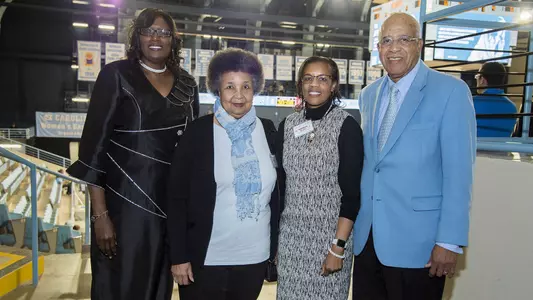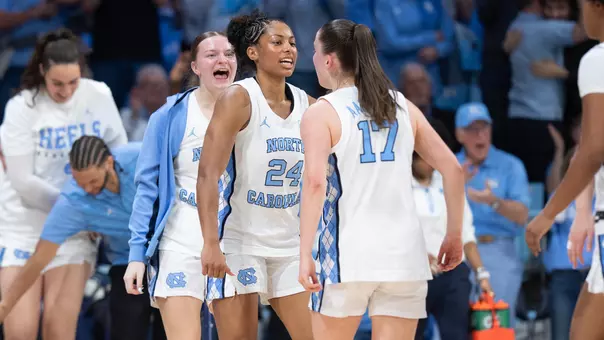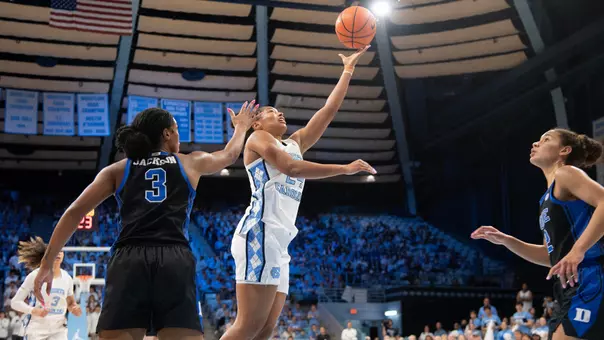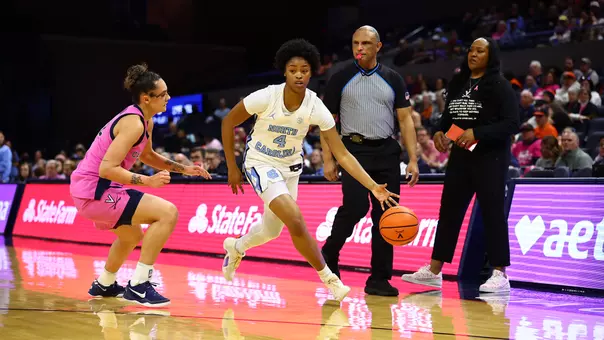University of North Carolina Athletics

Tresa Brown, Edith Wiggins, Deborah Stroman and Howard Lee
Photo by: Jeffrey A. Camarati
GoHeels Exclusive: Paying Tribute To African-American Pioneers
February 8, 2018 | Women's Basketball, Featured Writers
By Pat James, GoHeels.com
Coming out of Raleigh's Sanderson High in 1980, Tresa Brown could have continued her basketball career almost anywhere.
The likes of Southern California and Kentucky recruited her. But the allure of staying close to home and, perhaps more importantly, playing for a less-established program led her to join the North Carolina women's basketball team.
"I wanted to be a part of the building process," Brown said, "and I'm glad I chose Carolina for that reason."
Brown, who played at UNC for four seasons (1981-84), proved to be one of the most influential figures in the program's rise to national prominence.
Behind her, the Tar Heels reached the NCAA Tournament for the first time in 1983. She then carried them to their first ACC Championship as a senior in 1984. She averaged 20.8 points that season and became the first UNC player to earn both Kodak All-America and ACC Player of the Year honors.
UNC has recognized Brown in the past, honoring her jersey in 1995 and naming her an ACC Women's Basketball Legend in 2008. But Wednesday, she was honored in a different way, one that initially surprised her.
For the third straight year, the women's basketball program teamed up with the Carolina Black Caucus to host a tribute to Black History Month. The Tar Heels' game against Virginia Tech served as a platform to recognize African-American pioneers from the basketball program and the University community, including Brown.
"Everything we've done and everything we've accomplished in the women's basketball program here at UNC, it was always team," said Brown, who was accompanied by her father, Henry, and former high school coach, Lawrence Dunn. "I never looked at it from the aspect of Afro-American being honored, coming from this angle. But it does make sense, and I'm very, very humble. I'm actually elated, too, at the same time."
Of Wednesday's four honorees, the other with ties to the women's basketball program was Dr. Deborah Stroman.
Stroman, who played basketball at Virginia and graduated in 1982 with a bachelor's degree in history and social studies, came to UNC pursuing a master's degree in athletic administration. She joined women's basketball coach Jennifer Alley's staff as a graduate assistant for the 1983-84 and 1984-85 seasons.
"(Alley) was definitely a pioneer because back then you did not have a lot of black players on the team, and she definitely opened that up for North Carolina," Stroman said. "It probably was no surprise that she would be more than welcoming of myself to come on her coaching staff."
Stroman went on to own and manage her own business ventures. But in 2007, she returned to UNC as a professor.
She's currently a faculty member at UNC Gillings School of Global Public Health and a business adviser for the University. She also teaches various courses in the sports business and entrepreneurship domains.
In 2017, Stroman was inducted into the Order of the Golden Fleece, the University's highest and oldest honor society
"When I was little, I thought I would end up being a teacher or an educator of some sort, and that's played out in my life," she said. "I never thought I'd be in higher ed, though. But I just love it. There's nothing like working with young people and providing them opportunities that are really unique."
That's what Howard Lee, another honoree, has attempted to do during his distinguished career in public service.
In the early 1960s, Lee was working as a juvenile probation officer in Savannah, Georgia, when he attended a speech by Frank Porter Graham, a former UNC president and U.S. Senator. Graham encouraged Lee to apply to the UNC School of Social Work. When Lee was accepted, Graham helped him get financial aid.
After receiving his master's degree in social work in 1966, Lee was hired to direct a research program at Duke. He and his wife tried to buy a house in Chapel Hill. But no realtor, he said, would sell them one outside the black community.
They finally settled in the Colony Woods neighborhood. Yet they spent the next year living "under the threat of death."
"The problems were all over," Lee said. "But I will say there were a lot more people in Chapel Hill who were progressive thinkers, the faculty at the University and students here at the University. And, of course, when we went through that, all the folks here rallied around us and gave us support."
With the backing of people like Dean Smith, Lee decided to enter local politics. He was elected mayor of Chapel Hill on May 6, 1969, making him the first African-American to be elected mayor of a predominantly white southern town since Reconstruction.
Lee held that position through 1975. He was later elected to the North Carolina Senate in 1990 and served from 1990-94 and 1996-2002. In 2003, he became the first African-American elected by the N.C. State Board of Education to be its chair.
He's currently the president of the Howard N. Lee Institute, which "focuses on erasing the achievement gap and improving academic performance for minority males."
"To see the athletic program reach out and embrace and recognize contributions by people who are not necessarily a part of the athletic program is admirable," Lee said, "and certainly I commend Coach (Sylvia) Hatchell and all the others who have been involved in this.
"I do think this speaks volumes because I think all of us can agree that universities cannot allow athletics to become the dominant lead in what the university is all about. So when this happens and the two come together, it certainly signifies that we recognize we can have this kind of marriage and support."
Also honored Wednesday was Edith Wiggins.
After being the director of the Campus Y, she became the first African-American female vice chancellor at UNC. She served as vice chancellor and dean of student affairs from 1994-96. She later became a member of the Chapel Hill-Carrboro School Board and the Chapel Hill Town Council.
"I've been retired a long time," Wiggins said. "But particularly for the black students and the black faculty and staff who have come recently, it's kind of an inspiration to them to know that others were here before. When they meet me, that's what they say. 'Thank you for being here and helping make the way.'"
Coming out of Raleigh's Sanderson High in 1980, Tresa Brown could have continued her basketball career almost anywhere.
The likes of Southern California and Kentucky recruited her. But the allure of staying close to home and, perhaps more importantly, playing for a less-established program led her to join the North Carolina women's basketball team.
"I wanted to be a part of the building process," Brown said, "and I'm glad I chose Carolina for that reason."
Brown, who played at UNC for four seasons (1981-84), proved to be one of the most influential figures in the program's rise to national prominence.
Behind her, the Tar Heels reached the NCAA Tournament for the first time in 1983. She then carried them to their first ACC Championship as a senior in 1984. She averaged 20.8 points that season and became the first UNC player to earn both Kodak All-America and ACC Player of the Year honors.
UNC has recognized Brown in the past, honoring her jersey in 1995 and naming her an ACC Women's Basketball Legend in 2008. But Wednesday, she was honored in a different way, one that initially surprised her.
For the third straight year, the women's basketball program teamed up with the Carolina Black Caucus to host a tribute to Black History Month. The Tar Heels' game against Virginia Tech served as a platform to recognize African-American pioneers from the basketball program and the University community, including Brown.
"Everything we've done and everything we've accomplished in the women's basketball program here at UNC, it was always team," said Brown, who was accompanied by her father, Henry, and former high school coach, Lawrence Dunn. "I never looked at it from the aspect of Afro-American being honored, coming from this angle. But it does make sense, and I'm very, very humble. I'm actually elated, too, at the same time."
Of Wednesday's four honorees, the other with ties to the women's basketball program was Dr. Deborah Stroman.
Stroman, who played basketball at Virginia and graduated in 1982 with a bachelor's degree in history and social studies, came to UNC pursuing a master's degree in athletic administration. She joined women's basketball coach Jennifer Alley's staff as a graduate assistant for the 1983-84 and 1984-85 seasons.
"(Alley) was definitely a pioneer because back then you did not have a lot of black players on the team, and she definitely opened that up for North Carolina," Stroman said. "It probably was no surprise that she would be more than welcoming of myself to come on her coaching staff."
Stroman went on to own and manage her own business ventures. But in 2007, she returned to UNC as a professor.
She's currently a faculty member at UNC Gillings School of Global Public Health and a business adviser for the University. She also teaches various courses in the sports business and entrepreneurship domains.
In 2017, Stroman was inducted into the Order of the Golden Fleece, the University's highest and oldest honor society
"When I was little, I thought I would end up being a teacher or an educator of some sort, and that's played out in my life," she said. "I never thought I'd be in higher ed, though. But I just love it. There's nothing like working with young people and providing them opportunities that are really unique."
That's what Howard Lee, another honoree, has attempted to do during his distinguished career in public service.
In the early 1960s, Lee was working as a juvenile probation officer in Savannah, Georgia, when he attended a speech by Frank Porter Graham, a former UNC president and U.S. Senator. Graham encouraged Lee to apply to the UNC School of Social Work. When Lee was accepted, Graham helped him get financial aid.
After receiving his master's degree in social work in 1966, Lee was hired to direct a research program at Duke. He and his wife tried to buy a house in Chapel Hill. But no realtor, he said, would sell them one outside the black community.
They finally settled in the Colony Woods neighborhood. Yet they spent the next year living "under the threat of death."
"The problems were all over," Lee said. "But I will say there were a lot more people in Chapel Hill who were progressive thinkers, the faculty at the University and students here at the University. And, of course, when we went through that, all the folks here rallied around us and gave us support."
With the backing of people like Dean Smith, Lee decided to enter local politics. He was elected mayor of Chapel Hill on May 6, 1969, making him the first African-American to be elected mayor of a predominantly white southern town since Reconstruction.
Lee held that position through 1975. He was later elected to the North Carolina Senate in 1990 and served from 1990-94 and 1996-2002. In 2003, he became the first African-American elected by the N.C. State Board of Education to be its chair.
He's currently the president of the Howard N. Lee Institute, which "focuses on erasing the achievement gap and improving academic performance for minority males."
"To see the athletic program reach out and embrace and recognize contributions by people who are not necessarily a part of the athletic program is admirable," Lee said, "and certainly I commend Coach (Sylvia) Hatchell and all the others who have been involved in this.
"I do think this speaks volumes because I think all of us can agree that universities cannot allow athletics to become the dominant lead in what the university is all about. So when this happens and the two come together, it certainly signifies that we recognize we can have this kind of marriage and support."
Also honored Wednesday was Edith Wiggins.
After being the director of the Campus Y, she became the first African-American female vice chancellor at UNC. She served as vice chancellor and dean of student affairs from 1994-96. She later became a member of the Chapel Hill-Carrboro School Board and the Chapel Hill Town Council.
"I've been retired a long time," Wiggins said. "But particularly for the black students and the black faculty and staff who have come recently, it's kind of an inspiration to them to know that others were here before. When they meet me, that's what they say. 'Thank you for being here and helping make the way.'"
UNC Women's Lacrosse: Humphrey Fires Tar Heels Past Clemson, 12-9
Thursday, March 05
UNC Softball: Long Ball Propels Heels Over Stetson, 12-4
Thursday, March 05
THE ARENA DISCUSSION - Episode 2: Rick Steinbacher
Wednesday, March 04
MBB: Seth Trimble Senior Speech - March 3, 2026
Wednesday, March 04













